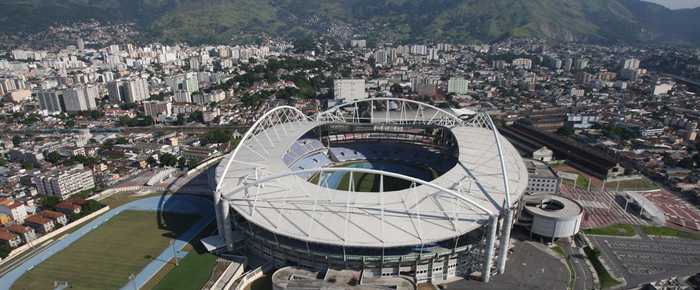
By Flint Wheeler
One of the Olympic stadiums just had its water and lights cut off because of unpaid bills. The builder for two other venues has had to lay off workers and hasn’t paid suppliers.
Cutbacks All Around
Athletes are also feeling the crunch. Davilani Cruz, a member of Brazil’s national taekwondo team, says a monthly stipend provided by Brazil’s Ministry of Sport hasn’t been paid in five months.
“I think this isn’t something that should be happening in an Olympic year,” Cruz says. “We athletes depend on the stipend to travel to competitions and we don’t have a lot of other support, so we end up lagging behind.”
The overall costs are difficult to pin down, but Brazil budgeted around $13 billion and is expected to go well beyond that, according to one report.
At an event this week marking the opening of the athletics stadium, Rio’s mayor, Eduardo Paes, faced a barrage of questions about the hospital crisis and budget cuts.
“We have enough money to do everything that is supposed to be done, as you can see here,” he said. “We are not China, we are not England. We are not a rich country. So every time we can cut some of the budget of the Olympics, we will do it. This is not going to be an Olympics of wasting money.”
So the mayor is selling this crisis as a good thing?
Infrastructure race
Against this troubled backdrop Olympic preparations are still progressing as Brazil desperately attempts to ensure that all venues and transport links are completed before the opening ceremony at the Maracanã stadium, on 5 August.
On Thursday an elevated cycle path over the sea, built for the Games at a cost of $5 Million, collapsed and killed at least two people, with the cause unknown. According to the city’s website, the velodrome is only 83% completed because of problems in laying the track, while the tennis center is 90% ready.
Zika concerns
The mosquito-borne virus that has spread across many countries in South and Central America has caused serious concern in Brazil. British athletes preparing to compete at the Games have been updated on dangers and prevention. There is no vaccination for Zika, which can lead to babies being born with underdeveloped brains, and the World Health Organization has declared the outbreak a global public health emergency with an estimated 1.5 million people infected.
However, the International Olympic Committee is confident that the Games will not be affected by the virus and organizers are hopeful that the dryer, cooler climate in August – Brazil’s winter – will help ease the problem. Officials say stagnant water at venues is being drained and that possible mosquito breeding grounds will be eliminated by medical experts. Many athletes, World Famous have already opted-out of this fiasco.
Ticket sales and local apathy
Around half of the 7.5m Olympic tickets remain unsold, with the Paralympic Games sales having barely got off the ground. The Zika virus could be a factor in the low level of foreign purchases but a major issue has been domestic apathy. At the beginning of April the new Brazilian sports minister, Ricardo Leyser, was quoted as saying “there is a perception that the Brazilian population has not yet woken up for the Games”, amid suggestions that tickets could be given to school children in an effort to ensure venues are full.
It is fair to say that the Games do not have total support from Brazilians. Evicted residents from the Vila Autódromo favela – making way for the Olympic Park – protested in the streets, while the decision to build the golf course on an Area of Environmental Protection angered local campaigners.
Russia’s athletics ban
Away from the domestic troubles, the most intriguing element of the Olympic build-up centers on Russia’s disgraced athletes. An independent report commissioned by the World Anti-Doping Agency last year found the country guilty of running a state-sponsored doping program, resulting in Russian athletes being banned from all international competition.
This is and will continue to be an interesting situation. One has to sit back and ask if this sporting event is worth displacing people’s homes, riots, birth defects and potential terrorism threats. Sometimes it’s just easier (and smarter) to stay home.








































